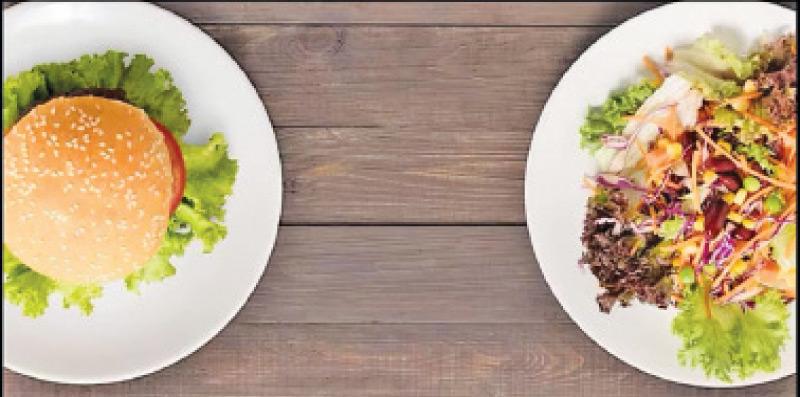
Human brains may be equipped with an in-built calorie counter that stops us from overeating and piling on the pounds.
That is according to diet researchers, who think we can subconsciously gauge how fatty meals are.
It allows people to adjust their intake accordingly, depending on if they are eating a energy-rich pasta or a healthy salad.
Participants in a study chose to eat smaller portions of cheesy pastas — despite not being told to.
The University of Bristol findings upend previous scientific thinking that people are mindless gorgers, unaware of how many calories they consume.
She added: ‘For years we’ve believed humans mindlessly overeat energy-rich meals.
‘Remarkably, this study indicates a degree of nutritional intelligence where humans manage to adjust the amount they consume of high-energy density options.’
Twenty healthy people took part in the four-week long study, which took place on a hospital ward. Participants were given a variety of specially-crafted meals.
Meals had different calorie densities, such as a chicken salad sandwich with fig roll biscuits or porridge with blueberries and almonds.
Ms Flynn and team measured exactly how many grams of each meal volunteers ate.
The results showed a ‘turning point’, where people eating energy-dense foods then subconsciously started to eat smaller portions.
‘For instance, people ate smaller portions of a creamy cheese pasta dish, which is an energy-rich meal, than a salad with lots of different vegetables which is relatively energy-poor,’ Ms Flynn said.
Study co-author Prof. Jeff Brunstrom added the results showed humans weren’t just mindless eaters. ‘This research gives added weight to the idea humans aren’t passive overeaters after all, but show the discerning ability to moderate how much of an energy-rich meal they consume,’ he said.
‘This work is particularly exciting as it reveals a hidden complexity to how humans interact with modern energy-rich foods, something we’ve been referring to as “nutritional intelligence”.’
Bristol’s findings, in The American Journal of Clinical Nutrition, raise important questions regarding high energy foods being linked to obesity.
‘What this tells us is we don’t seem to passively overconsume these foods and so the reason why they are associated with obesity is more nuanced than previously thought,’ he said.
‘For now, at least this offers a new perspective on a longstanding issue and it opens the door to a range of important new questions and avenues for future research.’ More than 42million adults in the UK will be overweight or obese by 2040, according to projections by Cancer Research UK
Obesity is one of Britain’s biggest health issues, with data showing two-thirds of adults are too fat.
An analysis by Cancer Research UK last month predicted the toll will surpass the 70 per cent figure in the next two decades.
In the US an estimated 73.6 per cent of adults are considered either overweight or obese.
Being overweight or obese is known to increase the risk of at least 13 different types of cancer and also causes other dangerous health conditions such as high blood pressure and type 2 diabetes.
– Daily Mail.uk
WHAT SHOULD A BALANCED DIET LOOK LIKE
Scientists say the human brain has a subconscious calorie-counter capable of preventing us from overeating
Meals should be based on potatoes, bread, rice, pasta or other starchy carbohydrates, ideally wholegrain, according to the NHS
• Eat at least 5 portions of a variety of fruit and vegetables every day. All fresh, frozen, dried and canned fruit and vegetables count
• Base meals on potatoes, bread, rice, pasta or other starchy carbohydrates, ideally wholegrain
• 30 grams of fibre a day: This is the same as eating all of the following: 5 portions of fruit and vegetables, 2 whole-wheat cereal biscuits, 2 thick slices of wholemeal bread and large baked potato with the skin on
• Have some dairy or dairy alternatives (such as soya drinks) choosing lower fat and lower sugar options
• Eat some beans, pulses, fish, eggs, meat and other proteins (including 2 portions of fish every week, one of which should be oily)
• Choose unsaturated oils and spreads and consuming in small amounts
• Drink 6-8 cups/glasses of water a day
• Adults should have less than 6g of salt and 20g of saturated fat for women or 30g for men a day
Source: NHS Eatwell Guide
Lead author Annika Flynn said the research showed people are smarter eaters than previously given credit for.
